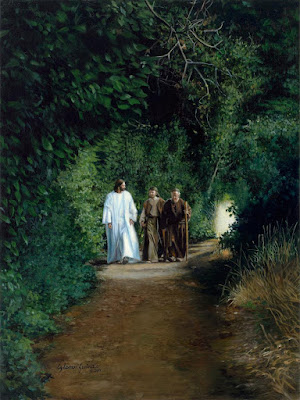I am a very
visual person and I adore good art. I have saved in my computer close to 2,000
pictures of different categories. One of my categories is ‘favourite artists’
who paint pictures of Christ and which number 30. Of all my photos, 906 are
pictures of the Saviour alone.
This is
what perplexes me. Of these 906 pictures of Christ, there are no two alike.
Every artist has portrayed Him differently numerous times yet somehow there is
a common denominator in all of them because the Saviour is recognized in every
one. I have even seen pictures online of Him dressed in a suit and it still
looks like Him.
When my
oldest daughter was about 1 year old, I taught her to recognize the Saviour in our
pictures of Him in our home. I would hold her and take her to the picture on
the wall and say to her in Croatian: “Dragi Jesus”, meaning ‘Dear Jesus’ and
she would stroke His face with her chubby little hand. She knew that’s who He
was in every picture. When she started speaking I would point to the picture of
Him and ask her who it is and she would say: “Dragi Jesus”. When she started
walking, I would ask her where He is and she would immediately go to the
picture.
I have posted untold amount of pictures of the Saviour on social media over the years. From time to time someone would voice their displeasure at the picture they didn’t like. We all seem to have a different perception of what He looks like in reality. The most common objection I have come across is the colour of His eyes. Some people cannot accept the possibility that the Saviour might have blue eyes.
These people are determined that He looks Middle Eastern and has to
have brown eyes. I have even had to contend with someone who insisted that
Jesus was black and that all Hebrews hail from Negro origin. That had me
reading their comments with my mouth open.
My point is
this. Yes, it does matter what Jesus looks like…..because He is the Son of God…..in
every way, most especially the physical. He re-affirmed this reality numerous
times while in the flesh. It is important that we recognize this. If we do not acknowledge
His physical parentage then He cannot be the Messiah.
When
Philip, His disciple, asked Him to show them the Father, Jesus answered: “He
who has seen me, has seen the Father….believe me that I am in the Father and
the Father in me” (John 14:8,9). In other words, we think alike, we act alike
and we look alike.
Apostle
Paul reiterated this important fact when he said that Christ was ‘in the image
of the invisible God’ and ‘in the express image of His Father’ (Colossians
1:12-15; Hebrews 1:1-3). This means that Jesus did not resemble His Jewish
mother. The Father is not Jewish or Middle Eastern or of any nationality of this
earth. Therefore, Jesus could very well have blue eyes.
The
importance is this…..the common denominator in all the pictures of the Saviour
is the fact that He is the Son of God and that reality is reflected in His
image. The holiness, the godliness, the very essence of His being brings the
Father to us through the pictures of the artists who all think differently yet
they all manage to convey who the Saviour is. I stand in awe of this talent.
So when we
see a picture of Jesus, I hope the first thing we see is the Son of God.
- CATHRYNE ALLEN
(Art: My Teacher by Chris Brazelton)














